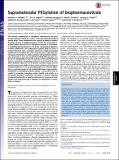Supramolecular PEGylation of biopharmaceuticals
Author(s)
Vinciguerra, Brittany; Thapa, Lavanya S.; Jhunjhunwala, Siddharth; Isaacs, Lyle; Webber, Matthew; Appel, Eric; Cortinas, Abel Bryan; Langer, Robert S; Anderson, Daniel Griffith; ... Show more Show less
DownloadWebber-2016-Supramolecular PEGylation of bioph.pdf (1.090Mb)
PUBLISHER_POLICY
Publisher Policy
Article is made available in accordance with the publisher's policy and may be subject to US copyright law. Please refer to the publisher's site for terms of use.
Terms of use
Metadata
Show full item recordAbstract
The covalent modification of therapeutic biomolecules has been broadly explored, leading to a number of clinically approved modified protein drugs. These modifications are typically intended to address challenges arising in biopharmaceutical practice by promoting improved stability and shelf life of therapeutic proteins in formulation, or modifying pharmacokinetics in the body. Toward these objectives, covalent modification with poly(ethylene glycol) (PEG) has been a common direction. Here, a platform approach to biopharmaceutical modification is described that relies on noncovalent, supramolecular host–guest interactions to endow proteins with prosthetic functionality. Specifically, a series of cucurbit[7]uril (CB[7])–PEG conjugates are shown to substantially increase the stability of three distinct protein drugs in formulation. Leveraging the known and high-affinity interaction between CB[7] and an N-terminal aromatic residue on one specific protein drug, insulin, further results in altering of its pharmacological properties in vivo by extending activity in a manner dependent on molecular weight of the attached PEG chain. Supramolecular modification of therapeutic proteins affords a noncovalent route to modify its properties, improving protein stability and activity as a formulation excipient. Furthermore, this offers a modular approach to append functionality to biopharmaceuticals by noncovalent modification with other molecules or polymers, for applications in formulation or therapy.
Date issued
2016-11Department
Massachusetts Institute of Technology. Institute for Medical Engineering & Science; Harvard University--MIT Division of Health Sciences and Technology; Massachusetts Institute of Technology. Department of Chemical Engineering; Koch Institute for Integrative Cancer Research at MITJournal
Proceedings of the National Academy of Sciences
Publisher
National Academy of Sciences (U.S.)
Citation
Webber, Matthew J. et al. “Supramolecular PEGylation of Biopharmaceuticals.” Proceedings of the National Academy of Sciences 113, 50 (December 2016): 14189–14194 © 2016 National Academy of Sciences
Version: Final published version
ISSN
0027-8424
1091-6490